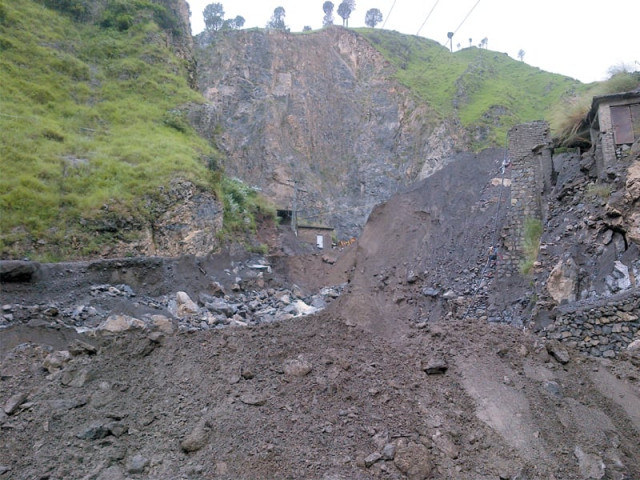Crushed
Businesses in K-P are carelessly cutting down trees without replacing them, resulting in massive deforestation.

I experienced that shock firsthand. On the invitation of some villagers from an affected area, I decided to make the journey and witness the situation for myself. After an hour-and-a-half, I reached Ghora Gali at Rawalpindi-Murree Road and took a left turn to make my way towards Abbottabad. Anticipating scenic forests, I drove three miles further only to see disfigured and defiled hills.
Stone-crushers appeared to occupy these most beautiful valleys, disturbing the landscape’s natural geographical formations and archaeological features. The pristine, clean environment has been replaced by the pungent smell of industry and the noise of motors. Heavy traffic, such as trucks and dumpers, has damaged roads and bridges and noise pollution has made the area, once a getaway from city noise and pressure, almost unliveable. Even spring water, commonly known as ‘aab-i-shifa’, has become polluted because of careless human habitation around the spring’s source.
“The activities have either polluted or completely destroyed our drinking water sources,” complains Masood Khan, a resident. “A good night’s sleep or even an afternoon nap is difficult to come by because of noise from the machinery and constant blasting by workers.”
“A stone-crushing mafia has been cutting down forests to install more and more crushing units,” says Jawadullah Khan, a social worker. “Diseases have erupted in our lush green valley because two dozen stone-crushing plants have been installed on both sides of the Lora-Abbottabad Road.”
I looked around. Giant tree and earth cutters have been placed and pine trees, among others, are being brutally cut down. Seed-eating birds such as doves, parrots and pigeons, which nested in the region for centuries and used the trees as a source of food, are spotted far and few between while garbage-eating birds like mynas, pied mynas, Indian kites and crows have descended upon the area to feed on the increased filth and waste. Plantation experts add that cutting down a tree basically means damaging the natural cycle in which birds spread seeds through their droppings that lead Shahtoot, Dhraik, Tali, Kiker and Kachnaar to sprout.
Among the bigger stone-crushing units is one that belongs to the National Logistics Cell and is located along the famous Haroo Stream in Maal Moola village (in Khyber-Pakhtunkhwa’s Hazara division). The construction of the unit was aided by the Punjab government, which has awarded a lucrative contract to the NLC for transporting crushed stone and other building material to Murree for a Punjab-sanctioned project.
Abbottabad DCO Imtiaz Hussain categorically denies having issued a No-Objection Certificate for the NLC plant. “Peshawar might have issued them permission but we haven’t been provided any information regarding that either,” he adds.
In fact, he says, the Abbottabad district administration has tried, albeit unsuccessfully, to crack down on the continuous growth in the number of stone-crushing units. “The administration cancelled the lease granted earlier to these stone-crushing units but then the provincial departments of mines and environment issued NOCs in the stone-crushers’ favour,” he says.
Most stone-crushing activity takes place along the fairly busy Ghora Gali-Lora Road, which means that residents often end up stuck in hour-long traffic jams as workers halt traffic to carry out unscheduled blasts. A stone’s throw away is a police checkpoint, but the men manning it appear reluctant to act.
“We have lodged a dozen complaints, but all in vain,” says Arshad Ali, another resident. “Our daily activities are disrupted at times because the stone-crushers start blasting without a previously announced schedule,” he adds.
Although it may appear as if there is no legal regulation of the situation, legal eagles point to the NWFP Mining Concession Rules 2005 which lays down certain conditions before a license can be issued to stone-crushing businesses. But these rules, however, are hardly ever implemented.
“Without a strong system for implementing these rules and regulations, we are inviting everyone to damage the environment for personal interests,” says Kosar Naqvi, an Abbottabad-based journalist. “There are confirmed reports of serious diseases that have erupted in the area due to felling of trees. A resident lodged a complaint with Lora Police Station while another approached the current provincial chief minister but authorities are yet to make a move.”
“On the one hand, the government claims it is boosting environmental protection but on the other, they are permitting such cruel activities openly,” says Yasir Akhtar, a social worker. “They don’t realise that trees are lungs of the earth and very important for restoration of the eco-system.”
To attract attention towards this grave issue, climate change experts have even tried to put a monetary value to losses incurred by ignoring the environment. A five-year-old World Bank report says that Pakistan is losing Rs365 million annually due to environmental degradation. This may be least of the concerns of labourers who work for these stone-crushing units but environment experts in the Khyber-Pakhtunkhwa government must take cognisance that these trees take at least 50 years to grow to a point where they begin providing oxygen to the atmosphere. And by cutting them down without replacing them at a matching rate, they are creating a deficit that is becoming tougher and tougher to plug.
Published in The Express Tribune, Sunday Magazine, September 16th, 2012.
Like Express Tribune Magazine on Facebook and follow at @ETribuneMag



















COMMENTS
Comments are moderated and generally will be posted if they are on-topic and not abusive.
For more information, please see our Comments FAQ